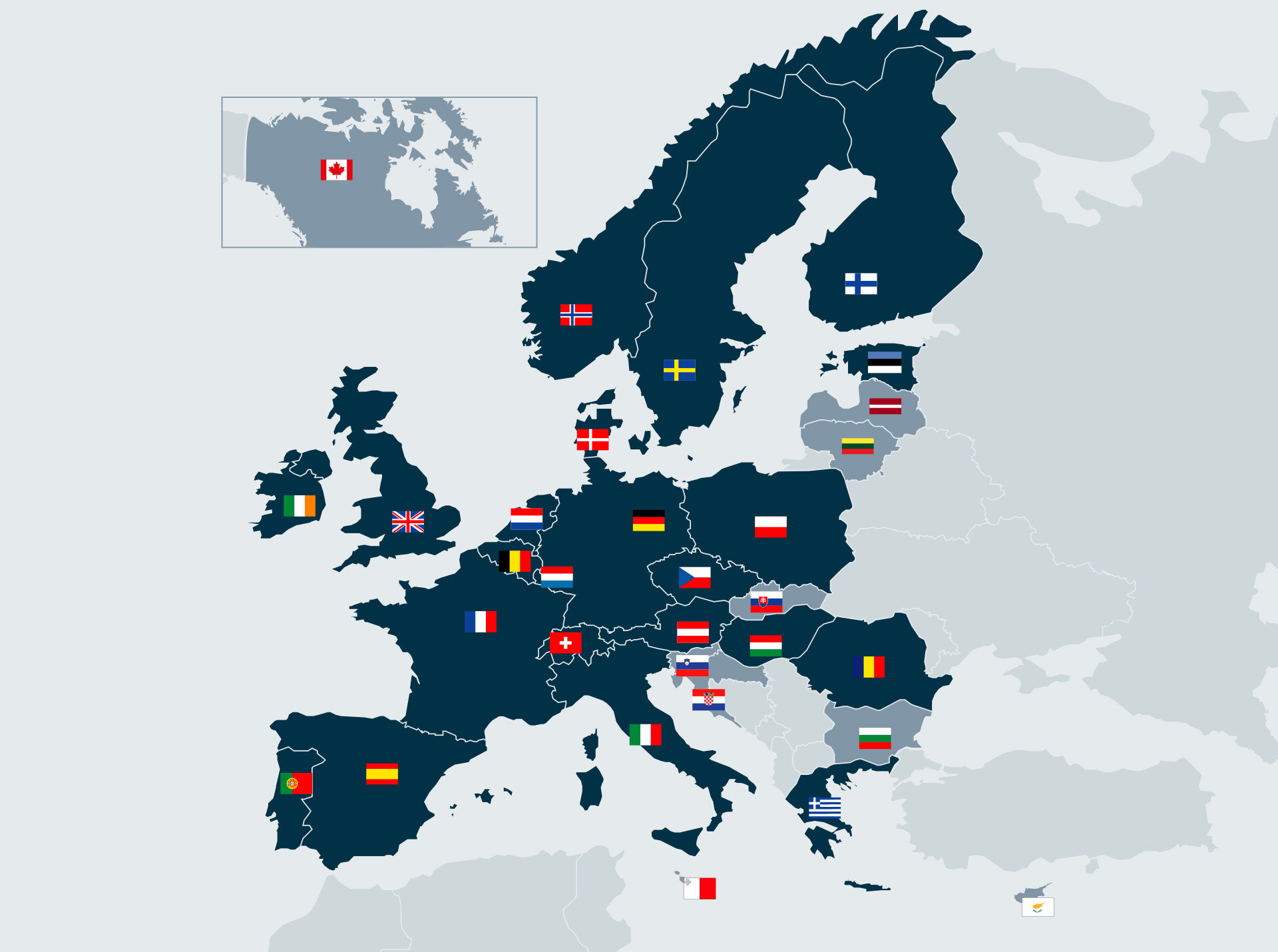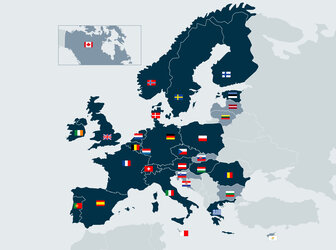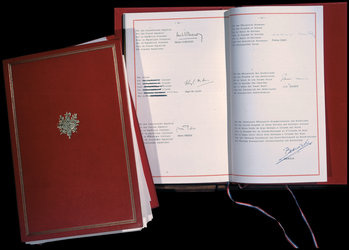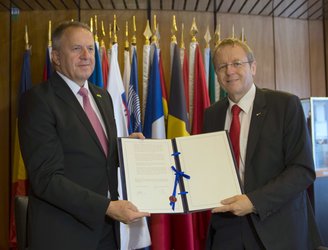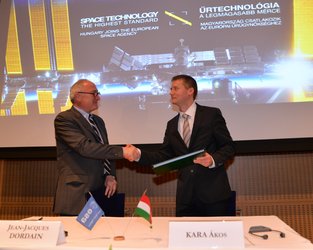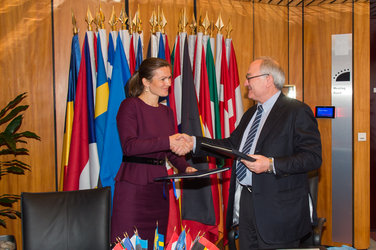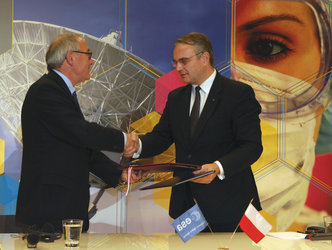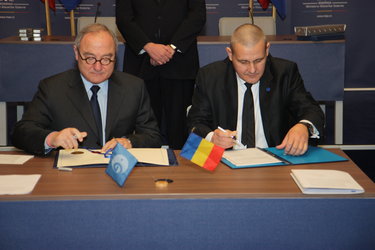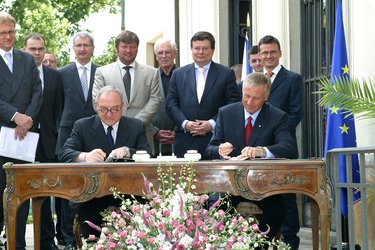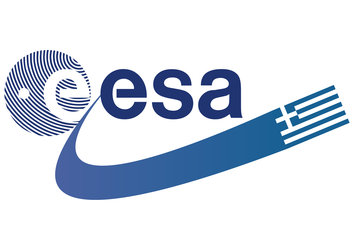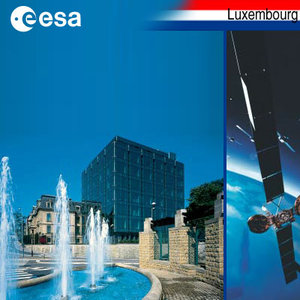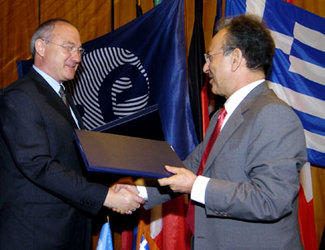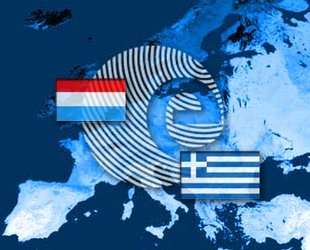Member States & Cooperating States
ESA has 22 Member States. The national bodies responsible for space in these countries sit on ESA’s governing Council. Canada also sits on the Council and takes part in some projects under a Cooperation Agreement. Slovakia, Slovenia, Latvia and Lithuania are Associate Members. Four other EU states have Cooperation Agreements with ESA: Bulgaria, Croatia, Cyprus and Malta.
There were 10 founding Member States in 1975: Belgium, Germany, Denmark, France, the United Kingdom, Italy, the Netherlands, Sweden, Switzerland, Spain. In that same year, Ireland signed the ESA Convention. Since then, 12 other countries joined, see all 22 Member States here. The latest to join are Estonia, which signed the Accession to the ESA Convention on 4 February 2015, to become the 21st Member State, and Hungary, which signed on 24 February 2015, to become the 22nd Member State.
As can be seen from this list, not all member countries of the European Union are members of ESA and not all ESA Member States are members of the EU. ESA is an entirely independent organisation although it maintains close ties with the EU through an ESA/EC Framework Agreement. The two organisations share a joint European Strategy for Space and have together developed the European Space Policy.
Cooperation Agreements, European Cooperating States and Associate Members
ESA has now established formal cooperation with all Member States of the European Union that are not ESA members. The ESA Convention provides for the different types of cooperation under its Article XIV. Currently, the different types are: general Cooperation Agreement, the European Cooperating State (ECS) and Associate Membership.
Prior to taking a step further in their relations with ESA by acceding to the Convention, Austria, Norway and Finland became Associate Members in 1987 and 1995 respectively (by doing so, they became the 12th, 13th and 14th ESA Member States). Slovenia became an Associate Member in 2016, followed by Latvia, Lithuania and Slovakia becoming Associate Members in 2020, 2021 and 2022 respectively.
Currently, there are three countries with ECS status: Bulgaria, Cyprus and Croatia, with Malta expected to become an ECS in early 2024. The definition of this new frame for cooperation dates back to 2001. It then opened up opportunities for four European countries, Czechia, Hungary, Poland and Romania, to be involved more closely with ESA programmes, procurements and activities. The intention was to stimulate relations with interested European countries, to expand the overall European scientific and industrial base and to enrich ESA as a research and development organisation.
In each case, the participation is to be defined in a five-year Plan for European Cooperating State (PECS) to be jointly agreed. This third-party funding scheme aims at increasing the national space competences and enabling ESA and the ECS to start working together on concrete activities. The PECS Committee, acting in coordination with ESA, monitors and controls the execution of the Plan.
Since 2003, ESA has signed 12 European Cooperating States agreements with the following countries (some of which have since become Member States or Associate Members):
- Hungary, April 2003
- Czechia (Czech Republic), November 2003
- Romania, February 2006
- Poland, April 2007
- Estonia, November 2009
- Slovenia, January 2010
- Latvia, March 2013
- Lithuania, October 2014
- Slovakia, February 2015
- Bulgaria, April 2015
- Cyprus, July 2016
- Croatia, February 2023
Czechia, Romania, Poland, Hungary and Estonia are now among the 22 ESA Member States, when their related Accession Agreements entered into force between 2008 and 2015.
To be a candidate for an ECS agreement, a country must be European and already have signed a Cooperation Agreement with ESA, which is the case for Malta since 2012. The Cooperation Agreement with Croatia entered into force on 7 September 2018 (Croatia is now a PECS member). Such Cooperation Agreements provide a common basis and the appropriate operational arrangements for an efficient and mutually beneficial cooperation with regard to space activities for peaceful purposes, on a no-exchange-of-funds basis.
The successful industrial integration of Member States at ESA is linked to the development of sustainable and competitive industrial capacities, to the integration of their industries in the space supply chain, and to the capability to achieve a satisfactory geographical return. Such integration requires a well-conceived and coherent process and to that effect specific industrial policy measures were introduced.
Students and Young Graduate Trainees (YGT)
Students from Associate Member or European Cooperating States are eligible to the Young Graduate Trainee scheme and entitled to apply to the 100 YGT opportunities published every year. They can also benefit from ESA's postdoctoral Research Fellowship programme. Croatia and Malta may provide opportunities for national trainees hosted at ESA and funded by national authorities.


